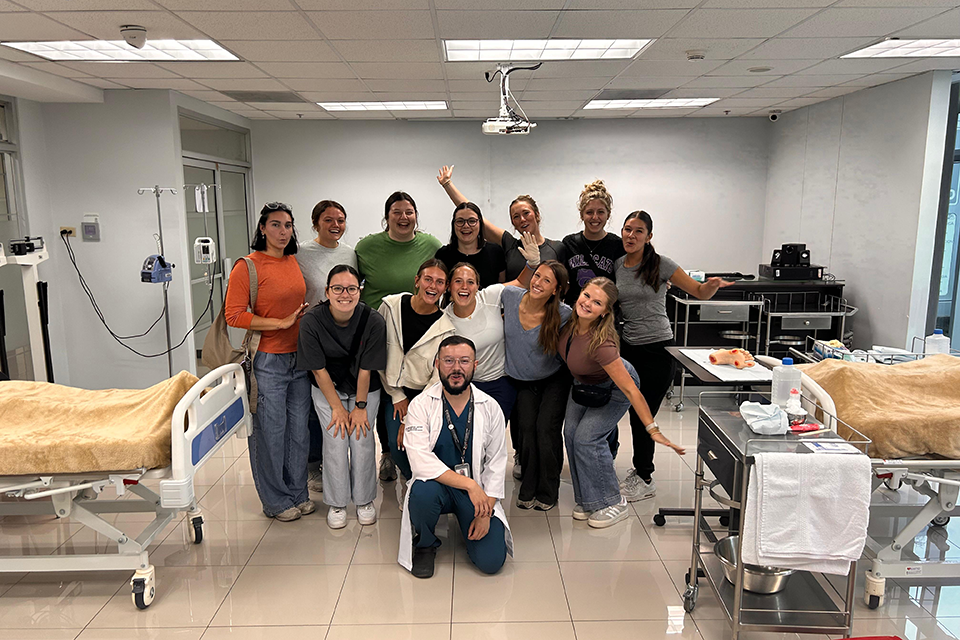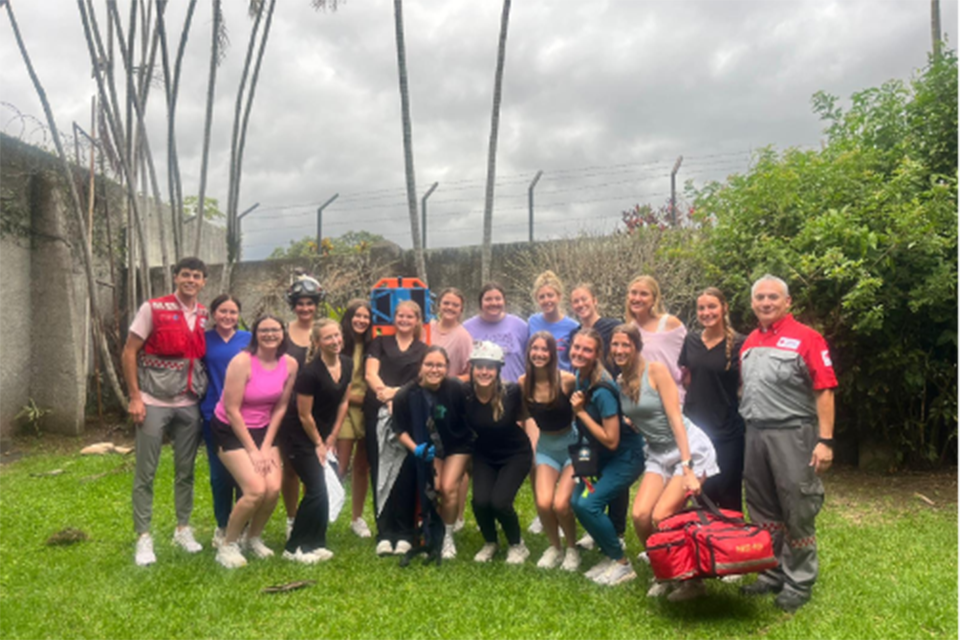Costa Rica trip gives pre-professional students a glimpse of healthcare around the world

Kansas State University pre-health students pose for a group photo with a Costa Rican health practitioner at Universidad Latina.
Kansas State University's Pre-Professional and Exploratory Advising Center has launched a new study abroad program tailored for pre-health students seeking meaningful exposure to health systems outside the U.S.
Recognizing demand for short-term, high-impact experiences, K-State's Education Abroad office collaborated with global learning programs to develop Pre-Health in Costa Rica. The country, known for its universal health care model and optional supplemental insurance, offered an ideal setting for students to see global health in action. The program was designed to support career exploration and provide direct patient care experiences.
The program provides students with crucial exposure to the differences between healthcare systems in a different country, particularly one with a universal healthcare system, said Sherryl Allen, health professions advisor.
"It expands their knowledge and understanding about healthcare and healthcare practices, how they can serve, and the innovations that exist in countries even outside of the U.S.," she said "Students often think the U.S. is one of the most medically innovative countries, and then they're exposed to a small country doing such amazing things."
From May 19–June 2, 18 K-State students participated in a two-week program in Costa Rica. Through clinical shadowing, facility tours, service-learning projects, hands-on activities and lectures from local health professionals, students engaged with the Costa Rican health system and the Spanish language while gaining insight into health care delivery, public health practices and the cultural context that shapes them.
"It's such a great experience that anyone can learn anything from — healthcare or not," said Lindsey Whorley, senior in pre-physical therapy. "Going to different hospitals and learning the different healthcare systems in Costa Rica has been such an eye-opening experience that I think anyone would benefit from."
Classrooms in clinics
The trip began in San José, where students explored links between environment, community health and well-being. Activities included touring Irazú Volcano and a national park, a walking tour of San José and a visit with a local health-related university program. Students also visited hot springs in La Fortuna and a beach in Manuel Antonio.
Students toured health care facilities in San José, including an abandoned sanatorium for tuberculosis patients, an art school and clinic that enrolls people experiencing homelessness, a national CEN-CINAI center focused on comprehensive care for children, a drug and alcohol detox center, an elderly residential center in San Carlos, a community-based clinic and a Red Cross workshop on administering first aid with limited resources.
“Coming here has enhanced my passion for helping others and for furthering my knowledge on healthcare,” said Kamryn Mendoza, senior in pre-medicine.
Among the service-learning experiences, Allen noted that the visit to Chepe Se Baña’s service center—a nonprofit focused on dignity-based care for unhoused populations—had a strong impact on students based on their in-the-moment responses. Students learned about harm reduction strategies, trauma-informed care and challenges faced by underserved populations.
 “Chepe Se Baña is a place where the homeless population can go and get food, shower, see a doctor, do laundry," said Madison Ziolo, sophomore in pre-dentistry. "The doctor was super awesome there, and very touching."
“Chepe Se Baña is a place where the homeless population can go and get food, shower, see a doctor, do laundry," said Madison Ziolo, sophomore in pre-dentistry. "The doctor was super awesome there, and very touching."
Students assisted with on-site tasks such as laundry and shower access support and shadowed the center’s physician during patient care.
Another hands-on experience was the Tico Tour at Finca Agroecológica Agua Azul, where students explored the use of indigenous medicinal plants in traditional Costa Rican medicine. A highlight included transforming raw cacao beans into chocolate, underscoring Costa Rica’s commitment to sustainability and how environmental stewardship intersects with public health.
Alongside a deeper understanding of global health care, students practiced public speaking, patient interaction and professional communication, while building teamwork, confidence and lasting connections, Allen said.
The result was a well-rounded experience that extended beyond academics for the students.
“They learned about health, life, natural resources, culture, the history of the Spanish language, and of course, good food,” Allen said.